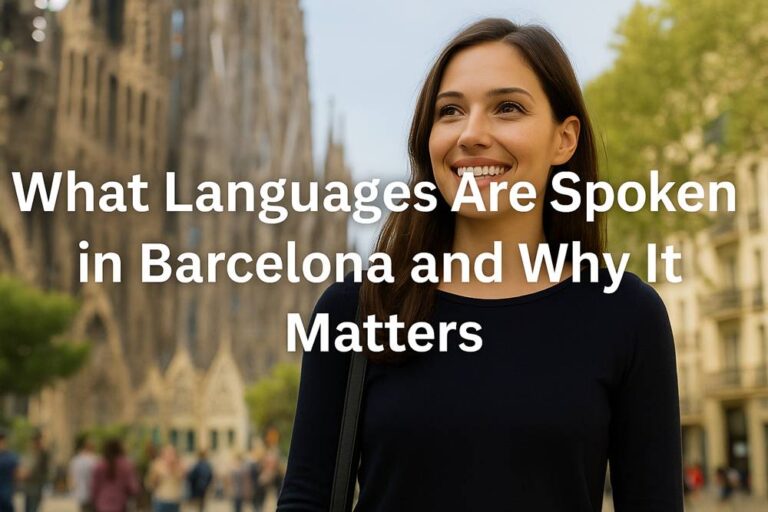Overview of Barcelona’s Linguistic Landscape: what languages are spoken in barcelona explained
When you first ask yourself what languages are spoken in barcelona, you might assume the answer is simply “Spanish.” But Barcelona is far more linguistically complex and fascinating. The city, located in the autonomous community of Catalonia, proudly showcases its bilingual identity through both Catalan and Spanish. With its rich cultural heritage and vibrant tourism, Barcelona offers a prime example of a modern multilingual city spain, where language is not just a tool for communication but a marker of identity.
Catalonia has its own government, its own traditions, and yes, its own language: Catalan. This means that understanding languages in catalonia is essential for both language learners and travelers. If you’re walking down La Rambla or shopping at Mercat de Sant Josep de la Boqueria, you’ll notice street signs in Catalan first, with Spanish often taking second place.
You may also hear snippets of English, French, Arabic, Urdu, and other immigrant languages floating through the city streets. That’s what makes exploring what languages are spoken in barcelona so interesting—it’s not just a matter of translation, but of embracing linguistic diversity.
For example, in schools, Catalan is the primary medium of instruction, even though Spanish is taught as a subject. This shows how deeply integrated Catalan is in daily life. Want to really understand how to integrate different speech strategies? Check out How to Improve My Speaking Skills Step by Step for practical tips that apply across languages.
Visitors are often amazed by the seamless code-switching—going from “Bon dia” to “Buenos días” and back to “Hello” in a single conversation. It’s not only useful but also respectful to understand the role of language here.
Table of Contents
Catalan: Heartbeat of Catalonia and daily life
Catalan is not a dialect of Spanish—it’s a language in its own right, with its own grammar, vocabulary, and history. Understanding what languages are spoken in barcelona means recognizing Catalan’s central role. As the local language barcelona residents speak, Catalan holds official status alongside Spanish in Catalonia. In many ways, it is the soul of the region, used in government, media, and education.
Catalan is so embedded in the local culture that not using it can be seen as a social faux pas. Street signs, restaurant menus, and even government documents are primarily in Catalan. It’s the first language children learn in schools, and it’s spoken in homes, shops, and parks. Understanding spanish or catalan spoken can greatly improve your ability to engage with locals and immerse yourself in Barcelona’s culture.
To boost your confidence, see how others have managed multilingual situations by visiting How to Become a Fluent Speaker in Real English Situations. If you want to speak like a local, even just learning a few phrases such as “Si us plau” (please), “Gràcies” (thank you), or “Bon dia” (good morning) can go a long way.
Even though Spanish is understood by all, many Catalans prefer to speak in Catalan, especially if you’re the one initiating the conversation. This preference isn’t rooted in animosity, but in pride and cultural preservation. For a global business perspective on language learning, check out Master Business English in 2025: Vocabulary, Idioms, and Conversations and apply the same ideas to Catalan.

Spanish in Barcelona: a practical lingua franca
Spanish, or Castellano, is the other official language in Barcelona, and understanding its role is essential when exploring what languages are spoken in barcelona. While Catalan is deeply rooted in regional pride, Spanish serves as the common thread that ties Barcelona with the rest of Spain and much of Latin America.
As part of the larger picture of languages in catalonia, Spanish is often the go-to language for tourists and in many business contexts. Spanish is also useful for navigating most services, especially if you’re not yet familiar with Catalan. Though you might be greeted with a cheerful “Bon dia,” switching to Spanish with “Buenos días” is totally acceptable.
Spanish plays a huge role in making Barcelona accessible. It allows you to talk to taxi drivers, understand menus in less touristy restaurants, and connect with people who may not speak English or Catalan. You can ease into these types of conversations by using the tips from What Is Fluence Training and Who Should Try It, which emphasizes real-life fluency.
As a barcelona language guide, knowing which language to use in different situations can help prevent awkward moments. While Catalan dominates local government and education, Spanish takes the lead in medical services, immigration offices, and travel agencies. Both coexist peacefully, but knowing which to use when is a skill you’ll refine over time.
Multilingual City Spain: English, French, and immigrant tongues
Barcelona isn’t just bilingual—it’s a true multilingual city spain. You’ll hear English on the streets, especially in tourist-heavy areas like Barceloneta or the Gothic Quarter. French is also common due to geographical proximity and tourism. But the real surprise comes from the diverse immigrant communities that call Barcelona home.
With an influx of residents from Pakistan, Morocco, China, and Latin America, languages like Urdu, Arabic, Mandarin, and Quechua are also part of the city’s auditory landscape. That’s why understanding languages in catalonia must go beyond just Catalan and Spanish.
It’s not uncommon to walk into a bakery in Raval and be greeted in Urdu or Arabic before switching to Spanish or English. This constant code-switching is part of the charm and challenge of life in Barcelona.
To better understand and participate in this language tapestry, consider insights from How to Be Fluent in English with Confidence and Ease. And remember, being multilingual isn’t just about learning multiple languages—it’s about developing empathy, listening skills, and adaptability.

Why travelers and learners should know what languages are spoken in barcelona
There are countless reasons why understanding what languages are spoken in barcelona is helpful, especially for travelers and language learners. If you’re visiting just for a weekend or planning to stay long-term, knowing the linguistic layout gives you an edge.
Let’s say you’re a student enrolling in a local university. The primary language of instruction? Catalan. Tourists, meanwhile, will get by with Spanish and English, but showing an effort to learn even a few Catalan phrases can earn respect. This is where having a clear barcelona language guide becomes invaluable.
To get around better, you’ll want to know signs like “Sortida” (Exit), “Carrer” (Street), or “Rambla” (Boulevard) — all in Catalan. These cues help you navigate and even connect with locals.
Moreover, understanding local language barcelona gives you deeper cultural appreciation. Imagine being at a festival and knowing the words to traditional Catalan songs. That kind of connection goes beyond tourism.
Tips to learn Catalan and Spanish before your trip
If you want to prepare ahead of your Barcelona adventure, here are five excellent strategies to learn Catalan and Spanish:
Use language learning apps like Duolingo or Memrise.
Take online lessons from local teachers in Barcelona.
Practice conversation with native speakers via language exchange platforms.
Dive into TV shows and movies in Catalan and Spanish.
Use fluency-boosting techniques from How to Be Fluent in English with Confidence and Ease.
These steps can help you handle both spanish or catalan spoken contexts and gain confidence when you arrive. Knowing basic phrases like “On és el lavabo?” (Where is the bathroom?) or “Quin preu té?” (How much does it cost?) makes a real difference.
Combining languages in Barcelona: using Catalan, Spanish, and English smoothly
Once you’re in Barcelona, blending languages becomes second nature. You might start a conversation in Catalan, switch to Spanish, and finish in English. This multilingual dance is not only common but expected.
Understanding what languages are spoken in barcelona means knowing when and how to switch depending on who you’re speaking to. For example:
In a bakery: Start with “Bon dia,” order in Spanish, thank them in English.
At a hotel: Ask in English, get a response in Spanish, and hear Catalan announcements.
The goal isn’t perfection—it’s participation. Learn what you can, try to use it, and locals will appreciate the effort. If you want to reach out for more language tips, feel free to Contact Us.
Barcelona’s beauty lies not only in its architecture and food but in its sounds—the symphony of Catalan pride, Spanish warmth, and global voices. Embrace it, and you’ll feel right at home.

How to Use I Speak English in Daily Situations Easily
Learn how to use i speak english confidently in daily conversations with phrases and simple speaking tips for real-life use.

How to Learn American Accent Fast with 5 Proven Tips
Learn how to learn american accent quickly through step-by-step pronunciation tips, listening habits, and practice drills.

How to Be Fluent in English and Use It Naturally Every Day
Learn how to become fluent in english with natural daily usage, conversation routines, and confidence building tips.
